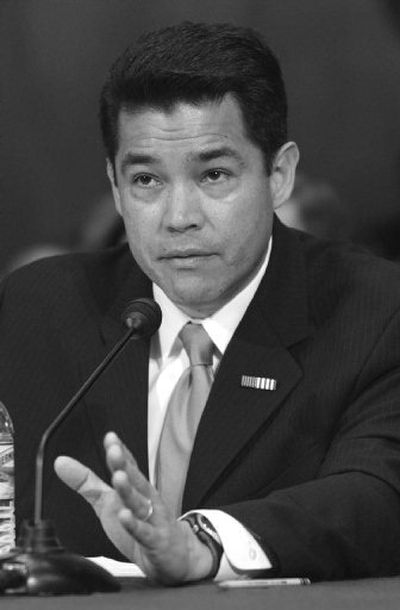GOP leader says he sought firing

WASHINGTON – Presidential adviser Karl Rove and at least one other member of the White House political team were urged by the New Mexico Republican Party chairman to fire the state’s U.S. attorney because of dissatisfaction in part with his failure to indict Democrats in a voter fraud investigation in the battleground election state.
In an interview Saturday with McClatchy Newspapers, Allen Weh, the party chairman, said he complained in 2005 about then-U.S. Attorney David Iglesias to a White House liaison who worked for Rove and asked that he be removed. Weh said he followed up with Rove personally in late 2006 during a visit to the White House.
“Is anything ever going to happen to that guy?” Weh said he asked Rove at a White House holiday event that month.
“He’s gone,” Rove said, according to Weh.
“I probably said something close to ‘Hallelujah,’ ” said Weh.
Weh’s account calls into question the Justice Department’s stance that the recent decision to fire Iglesias and seven U.S. attorneys in other states was a personnel matter – made without White House intervention. Justice Department officials have said the White House’s involvement was limited to approving a list of the U.S. attorneys after the Justice Department made the decision to fire them.
Rove could not be reached Saturday, and the White House and the Justice Department had no immediate response.
“The facts speak for themselves,” Iglesias said when he was told of Weh’s account of his conversation with Rove.
Weh’s disclosure comes as Congress investigates the circumstances behind the firings of the U.S. attorneys, most of whom had positive job evaluations, including Iglesias. Democrats have charged the Bush administration tried to inject partisan politics into federal prosecutions in order to influence election outcomes.
Weh said he doesn’t know whether Rove was directly involved in the firing or was merely advised of the decision.
Weh insisted this wasn’t about partisan politics.
“There’s nothing we’ve done that’s wrong,” he said. “It wasn’t that Iglesias wasn’t looking out for Republicans. He just wasn’t doing his job, period.”
But Iglesias, who was fired Dec. 7, said he believes politics was the driving force. He accused Republicans Sen. Pete Domenici and Rep. Heather Wilson of trying to pressure him to bring indictments against several Democrats in time for the 2006 congressional election.
Domenici and Wilson acknowledge calling Iglesias, but deny pressuring him.
Justice Department officials have revealed that Domenici repeatedly contacted officials within the department requesting Iglesias’ removal. But when asked Friday whether he contacted Rove about the issue, Domenici said he could not remember.
Iglesias said Friday he believes the impatience of state Republicans raises the possibility that the Bush administration might have been more involved than officials have acknowledged.
“Part of the controversy behind this is prosecutorial discretion,” Iglesias said. “What that means is, it’s up to the sole discretion of the prosecutor in the case of how to handle the indictment and when to issue it.”
Former federal prosecutors and defense lawyers who’ve represented public officials in corruption cases say the allegations of political interference could undermine the reputation of U.S. attorneys as impartial enforcers of the law.
“Anyone with any experience within the Justice Department is completely shocked and appalled by what has been described,” said Stanley Hunterton, a former federal prosecutor of 12 years who investigated organized crime in Detroit and Las Vegas. “One of the things the Department has stood for was being apolitical. Sure, politics does gets involved in the appointment process, but this is just nuts.”
Several Republican activists interviewed for this story said their frustration with Iglesias dated back to before the 2004 election and his decision to create a task force on voter fraud rather than try to prosecute Democrats who submitted allegedly fraudulent voter registrations.
They also felt that he had largely botched a corruption case against the state treasurer, a Democrat. After a mistrial, federal prosecutors eventually secured a conviction.